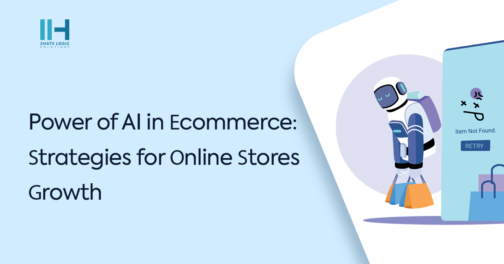Greetings! I'm Aneesh Sreedharan, CEO of 2Hats Logic Solutions. At 2Hats Logic Solutions, we are dedicated to providing technical expertise and resolving your concerns in the world of technology. Our blog page serves as a resource where we share insights and experiences, offering valuable perspectives on your queries.

AI is revolutionizing e-commerce, personalising recommendations, targeting ads, and powering virtual assistants for an enhanced experience. This technology is more than just hype; it’s transforming the way we shop online. At the same time, AI in ecommerce personalizes recommendations and drives virtual assistants, AI in retail transforms physical stores with smart shelves and cashier-less checkout, blurring the lines between online and offline for a seamless shopping future.
Imagine navigating a virtual store guided by an AI assistant who understands your needs, predicts future preferences, and even optimizes logistics for a faster, more personalized journey. This is the power of AI in e-commerce, and in this blog, we’ll explore how it can benefit your online store and the best tools and tips to empower it.
How AI improves E-commerce business
AI plays a major role in e-commerce businesses, transforming the entire shopping experience. Both businesses and customers reap the benefits of AI features. Let’s explore some of the ways AI upgrades the e-commerce business.
1. Data-driven Insights
AI algorithms analyse various data sets encompassing customer behaviour, purchase history, and demographics. There is even an AI plugin to generate analytics data reports in ecommerce stores like Shopware. By discerning patterns and trends, AI enables predictive analytics, forecasting future customer preferences and market trends.
2. Personalized Recommendations
AI-driven recommendation engines use machine learning to deliver personalised product suggestions. These recommendations, rooted in past purchases and browsing history, enhance the shopping experience, boosting conversion rates and fostering customer loyalty.
3. Improved Customer Service
AI chatbots and virtual assistants automate customer interactions, offering real-time support and assistance. Employing natural language processing, these systems address inquiries and resolve issues swiftly, enhancing overall customer satisfaction.
4. Optimized Inventory Management
AI algorithms optimize inventory levels by analyzing historical sales data and external factors. Accurate demand forecasting minimizes stockouts and overstocking, leading to cost savings and improved inventory turnover.
5. Better Security Measures
AI-powered fraud detection systems monitor real-time transactions, identifying suspicious activities and potential fraud. By leveraging machine learning, e-commerce platforms can protect sensitive information and uphold trust with customers.
6. Revenue Growth
AI-powered solutions such as personalized recommendations and dynamic pricing algorithms drive higher conversion rates and average order values. Optimized marketing campaigns based on AI insights further contribute to revenue growth.
7. Efficiency
Automated customer service and inventory management streamline operations, freeing up resources and reducing operational costs. AI-driven efficiency improvements enhance the overall profitability of e-commerce businesses.
8. Competitive Advantage
By using AI technologies, e-commerce store owners gain a stronghold in the market. Personalized experiences, efficient operations, and enhanced security differentiate their offerings and position them for sustained success.
Use cases of AI in ecommerce
Artificial Intelligence (AI) is reshaping the landscape of e-commerce, introducing innovative solutions to enhance customer experiences, streamline operations, and boost sales. Here are some compelling use cases illustrating how AI transforms the realm of online retail:
AI-powered chatbots and Virtual Assistants
Deploying AI-driven chatbots on your e-commerce website helps to provide instant support and assistance to customers. These chatbots can handle common inquiries, provide product recommendations, and assist with order tracking, improving overall customer service efficiency and satisfaction.
Personalized Product Recommendations
You can utilize AI algorithms to analyze customer data and browsing behaviour to deliver personalized product recommendations. Implementing recommendation engines on your website helps to suggest relevant products to customers based on their preferences, past purchases, and similar customer profiles.
Dynamic Pricing Algorithms
Implement AI-powered dynamic pricing algorithms to adjust product prices in real-time based on factors such as demand, competitor pricing, and inventory levels. Dynamic pricing allows you to optimize pricing strategies for maximum profitability and competitiveness in the market.
Visual Search
By Integrating AI-driven visual search technology into your e-commerce platform. It helps to enable customers to search for products using images. Visual search algorithms analyze images to identify similar products in your inventory. Thus, providing a convenient and intuitive shopping experience for customers.
Predictive Analytics for Inventory Management
Utilize AI-powered predictive analytics to forecast demand and optimize inventory management. Analyze historical sales data, market trends, and external factors to predict future demand accurately, ensuring optimal stock levels and minimizing stockouts and overstocking.
Personalized Email Marketing
Implement AI-driven email marketing tools to create personalized and targeted email campaigns. Analyze customer data and behaviour to segment your audience and deliver personalized email content. It can be product recommendations, promotions, and abandoned cart reminder, increasing engagement and conversion rates.
Fraud Detection and Security
There are AI-powered fraud detection systems to monitor transactions and identify suspicious activities in real-time. These systems analyze transaction data and patterns to detect fraudulent behaviour, protecting your e-commerce business from fraudulent transactions and safeguarding customer information.
Voice Commerce
There are voice commerce solutions that leverage AI-powered virtual assistants. Some of them like Amazon Alexa or Google Assistant, enable voice-based shopping experiences. By Implementing voice-enabled features on your e-commerce platform. It helps to allow customers to search for products, place orders, and track shipments using voice commands. This integration benefits disabled individuals, promoting independence and inclusivity.
Top AI tools for ecommerce
AI in ecommerce has solutions for your every business need. Let’s take a look at different tools that make your ecommerce journey easier.
Frase
The long-form content guru. If you need SEO-optimized blog posts, articles, or website copy, Frase has your back. But remember, it’s an assistant, not a replacement for your writing skills. This is available at a premium price tag for high-volume content.
Descript
Your AI-powered video editor. Descript transcribes, translates, and adds text-to-speech to your videos, making them more accessible and engaging. But remember, it’s not a full-fledged Hollywood editing suite. Consider the free plan limitations and weigh the paid options before diving in.
Blueshift
The real-time personalization whisperer. Blueshift personalizes your product recommendations, email marketing, and website content across channels, leveraging AI for customer segmentation and campaign optimization. However, its complexity and pricing might make it a better fit for enterprise-level businesses.
Amelia by IPSoft
Amelia is an AI-powered conversational platform offering virtual agents, like chatbots and voice assistants, for businesses. This Builds intelligent virtual assistants (IVAs) that can understand natural language and engage in human-like conversations. It also automates customer service, lead generation, order processing, and technical support tasks. Helps businesses provide 24/7 availability, personalised interactions, and multilingual support.
Aidaptive
Aidaptive is an AI and machine learning platform in the e-commerce space. It offers an end-to-end solution that blends intelligent automation with data-driven insights. Aidaptive leverages machine learning to predict customer behaviour and demand, allowing you to anticipate trends and personalize product recommendations in real-time.
Conclusion
The integration of AI in e-commerce is not just a trend but a transformative force reshaping the online shopping landscape. E-commerce development agencies play a crucial role in harnessing this power by implementing AI-driven tools and strategies. Through the expertise of these agencies, online store owners can experience a multitude of benefits, including personalized shopping experiences, streamlined operations, increased revenue, and enhanced security. From personalized product recommendations to dynamic pricing algorithms and AI-powered chatbots, the possibilities for integrating AI in e-commerce platforms like Shopware, Laravel, and Shopify are vast and promising. Embracing AI technologies with the assistance of an e-commerce development agency is no longer an option but a necessity for businesses looking to thrive in an increasingly competitive digital marketplace.
FAQ
What is AI's role in e-commerce?
AI plays a crucial role in e-commerce by personalizing recommendations, automating customer service through chatbots, optimizing inventory management, enhancing security measures, and driving efficiency and revenue growth.
How does AI benefit e-commerce store owners?
AI benefits e-commerce store owners by enabling personalized shopping experiences, streamlining operations, increasing revenue through higher conversion rates, mitigating risks through fraud detection, and providing a competitive advantage in the market.
What are some AI-powered tools for e-commerce?
AI-powered tools for e-commerce include chatbots and virtual assistants for customer service, recommendation engines for personalized product suggestions, dynamic pricing algorithms, visual search technology, predictive analytics for inventory management, personalized email marketing, fraud detection systems, and voice commerce solutions.
Why is AI integration important for e-commerce success?
AI integration is important for e-commerce success because it enhances the customer experience, improves operational efficiency, drives revenue growth, mitigates risks such as fraud, and provides a competitive edge in the market.
How can e-commerce store owners implement AI?
E-commerce store owners can implement AI by integrating AI-powered tools and solutions such as chatbots, recommendation engines, dynamic pricing algorithms, visual search technology, predictive analytics, personalized email marketing, fraud detection systems, and voice commerce features into their platforms with the assistance of e-commerce development agencies.
What can we expect from the future of AI in e-commerce?
The future of AI in e-commerce promises profound transformations, including hyper-personalization, advanced predictive analytics, enhanced customer engagement through technologies like AR and VR, the rise of voice commerce, and a growing emphasis on ethical AI practices to build trust with customers.

Related Articles






